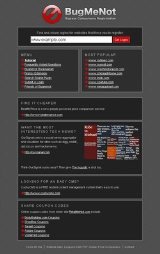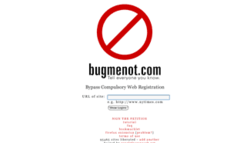
BugMeNot
Encyclopedia
BugMeNot is an internet
service that provides usernames and password
s to let Internet users bypass mandatory free registration on website
s. Started in August 2003 by an anonymous person, later revealed to be Guy King, it aims to allow Internet users to access websites that have registration walls (for instance, that of The New York Times
) with the requirement of compulsory registration. This came in response to the increasing number of websites that request such registration. Many Internet users find this to be an annoyance and a potential source of spam e-mail
. BugMeNot itself used to parody these sentiments in its own fake registration form.
and Spamgourmet
to create such accounts. However, it does not allow them to add accounts for pay websites, as this could potentially put BugMeNot in legal trouble. BugMeNot also claims to remove accounts for any web site that requests that they do not provide accounts for non-registered users.
To help make access to their service easier, BugMeNot hosts a bookmarklet
that can be used with any browser to automatically find a usable account from their service. They also host extensions
for the web browser
s Mozilla Firefox
, Internet Explorer
, and Google Chrome
(the extensions were created by Eric Hamiter with Dmytri Kleiner and Dean Wilson, respectively).
There are also other good uses for BugMeNot, in the form of a BugMeNot widget for Opera
, or UserJS scripts] along with buttons, which makes it fully browser integrated.

Wikipedia
is an example of a site blocked from being used with BugMeNot under the first criterion.
No option is provided for users to request removing a block if a site ceases to meet the blocking criteria or has never met them in the first place.
Site blocking can be circumvented by BugMeNot users by publishing usernames and passwords under a similar, but different, domain name to which they apply. For example, the owners of the domain abc.def.com might request a block to be put in place, but this will not prevent users uploading access information under the name of def.abc.com. Since one domain owner cannot demand that another domain be blocked, the information remains and is accessible provided that BugMeNot users tacitly agree that def.abc.com in fact refers to abc.def.com.
. The site's creator claimed BugMeNot's host was pressured by websites to shut them down, though Hostgator claimed that the BugMeNot site was repeatedly crashing their servers.
The BugMeNot domain was transferred briefly to another hosting company, dissidenthosting.com, but before the site was set up, it began to redirect visitors to web pages belonging to racist and/or fascist groups, without the knowledge or consent of the site's owner. BugMeNot moved again, to NearlyFreeSpeech.NET
. BugMeNot's move to this provider, which also hosts a number of highly controversial sites, prompted BugMeNot's creator to say, "Personally, I don't care if I'm sharing a server with neo-Nazis. I might not agree with what they have to say, but the whole thing about freedom of speech is that people are free to speak."
Shortly after BugMeNot returned, reports surfaced that some news sites had begun to attempt to block accounts posted on BugMeNot, though the extent and effectiveness of such efforts, as well as compliance with BugMeNot's Terms of Use, are not known. For several weeks in August 2008, the website was unavailable again; further inquiries revealed this was due to an oversight in the coding of the software that powers the website.
Internet
The Internet is a global system of interconnected computer networks that use the standard Internet protocol suite to serve billions of users worldwide...
service that provides usernames and password
Password
A password is a secret word or string of characters that is used for authentication, to prove identity or gain access to a resource . The password should be kept secret from those not allowed access....
s to let Internet users bypass mandatory free registration on website
Website
A website, also written as Web site, web site, or simply site, is a collection of related web pages containing images, videos or other digital assets. A website is hosted on at least one web server, accessible via a network such as the Internet or a private local area network through an Internet...
s. Started in August 2003 by an anonymous person, later revealed to be Guy King, it aims to allow Internet users to access websites that have registration walls (for instance, that of The New York Times
The New York Times
The New York Times is an American daily newspaper founded and continuously published in New York City since 1851. The New York Times has won 106 Pulitzer Prizes, the most of any news organization...
) with the requirement of compulsory registration. This came in response to the increasing number of websites that request such registration. Many Internet users find this to be an annoyance and a potential source of spam e-mail
E-mail
Electronic mail, commonly known as email or e-mail, is a method of exchanging digital messages from an author to one or more recipients. Modern email operates across the Internet or other computer networks. Some early email systems required that the author and the recipient both be online at the...
. BugMeNot itself used to parody these sentiments in its own fake registration form.
Use of the service
BugMeNot allows users of their service to add new accounts for sites with free registration. It also encourages users to use such fake e-mail account services as MailinatorMailinator
Mailinator is a free disposable e-mail address service created in 2003 by Paul Tyma. The idea is to let a user create a new e-mail address on-the-fly, whenever needed, for instance while filling a form on a web site....
and Spamgourmet
Spamgourmet
The internet service spamgourmet has offered disposable email addresses since October 29, 2000, as protection against spam. The service is free, and is supported by donations and advertisements on the website.- Functionality :...
to create such accounts. However, it does not allow them to add accounts for pay websites, as this could potentially put BugMeNot in legal trouble. BugMeNot also claims to remove accounts for any web site that requests that they do not provide accounts for non-registered users.
To help make access to their service easier, BugMeNot hosts a bookmarklet
Bookmarklet
A bookmarklet is Unobtrusive JavaScript stored as the URL of a bookmark in a web browser or as a hyperlink on a web page. The term is a portmanteau of the terms bookmark and applet, however, an applet is not to be confused with a bookmarklet just as JavaScript is not to be confused with Java...
that can be used with any browser to automatically find a usable account from their service. They also host extensions
Extension (Mozilla)
]Add-ons are installable enhancements to the Mozilla Foundation's projects, and projects based on them. Add-ons allow the user to add or augment application features, use themes to their liking, and handle new types of content.-Extensions:...
for the web browser
Web browser
A web browser is a software application for retrieving, presenting, and traversing information resources on the World Wide Web. An information resource is identified by a Uniform Resource Identifier and may be a web page, image, video, or other piece of content...
s Mozilla Firefox
Mozilla Firefox
Mozilla Firefox is a free and open source web browser descended from the Mozilla Application Suite and managed by Mozilla Corporation. , Firefox is the second most widely used browser, with approximately 25% of worldwide usage share of web browsers...
, Internet Explorer
Internet Explorer
Windows Internet Explorer is a series of graphical web browsers developed by Microsoft and included as part of the Microsoft Windows line of operating systems, starting in 1995. It was first released as part of the add-on package Plus! for Windows 95 that year...
, and Google Chrome
Google Chrome
Google Chrome is a web browser developed by Google that uses the WebKit layout engine. It was first released as a beta version for Microsoft Windows on September 2, 2008, and the public stable release was on December 11, 2008. The name is derived from the graphical user interface frame, or...
(the extensions were created by Eric Hamiter with Dmytri Kleiner and Dean Wilson, respectively).
There are also other good uses for BugMeNot, in the form of a BugMeNot widget for Opera
Opera (web browser)
Opera is a web browser and Internet suite developed by Opera Software with over 200 million users worldwide. The browser handles common Internet-related tasks such as displaying web sites, sending and receiving e-mail messages, managing contacts, chatting on IRC, downloading files via BitTorrent,...
, or UserJS scripts] along with buttons, which makes it fully browser integrated.

Opting out
BugMeNot provides an option for site owners to block their site from the bugmenot database, if they match one or more of the following criteria:- A community site where users register to change content, but not to view it
- The site is pay-per-view
- There is a fraud risk associated with the site due to accounts containing private financial information
Wikipedia
Wikipedia
Wikipedia is a free, web-based, collaborative, multilingual encyclopedia project supported by the non-profit Wikimedia Foundation. Its 20 million articles have been written collaboratively by volunteers around the world. Almost all of its articles can be edited by anyone with access to the site,...
is an example of a site blocked from being used with BugMeNot under the first criterion.
No option is provided for users to request removing a block if a site ceases to meet the blocking criteria or has never met them in the first place.
Site blocking can be circumvented by BugMeNot users by publishing usernames and passwords under a similar, but different, domain name to which they apply. For example, the owners of the domain abc.def.com might request a block to be put in place, but this will not prevent users uploading access information under the name of def.abc.com. Since one domain owner cannot demand that another domain be blocked, the information remains and is accessible provided that BugMeNot users tacitly agree that def.abc.com in fact refers to abc.def.com.
Temporary shutdown and return
Nearly a year after it was created BugMeNot was shut down temporarily by their service provider (at that time) HostGatorHostGator
HostGator is a Houston-based web hosting company with an additional presence in Austin, Texas. It was founded in 2002 by Brent Oxley, who was then a student at Florida Atlantic University. By 2006, HostGator had passed the 200,000 mark in registered domains. In 2008, Inc...
. The site's creator claimed BugMeNot's host was pressured by websites to shut them down, though Hostgator claimed that the BugMeNot site was repeatedly crashing their servers.
The BugMeNot domain was transferred briefly to another hosting company, dissidenthosting.com, but before the site was set up, it began to redirect visitors to web pages belonging to racist and/or fascist groups, without the knowledge or consent of the site's owner. BugMeNot moved again, to NearlyFreeSpeech.NET
NearlyFreeSpeech.NET
NearlyFreeSpeech.NET is a web hosting service that provides low-cost services for low-use websites. It is unique in that it offers SSH access to all its users, whereas most services charge a premium for this access.- Company name :...
. BugMeNot's move to this provider, which also hosts a number of highly controversial sites, prompted BugMeNot's creator to say, "Personally, I don't care if I'm sharing a server with neo-Nazis. I might not agree with what they have to say, but the whole thing about freedom of speech is that people are free to speak."
Shortly after BugMeNot returned, reports surfaced that some news sites had begun to attempt to block accounts posted on BugMeNot, though the extent and effectiveness of such efforts, as well as compliance with BugMeNot's Terms of Use, are not known. For several weeks in August 2008, the website was unavailable again; further inquiries revealed this was due to an oversight in the coding of the software that powers the website.

